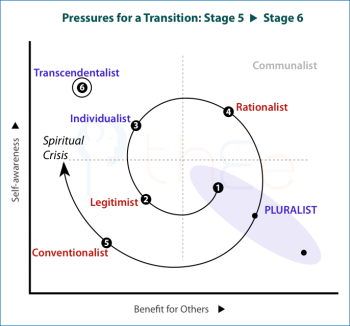Political Transition #5
It Won't Be All Roses

The will emerge during an era of unmistakable duplicity of the political classes and a perceived failure of the political system. People will say: "it's broken", and yet strive for continuity. After a long period of blaming the politicians, their own responsibility will emerge. The specifically enables new norms built around social pressure rather than legislation: see a hypothetical strategy.
Social consensus will be dominated by conventional wisdom, and an insistence on correction of egregious errors. Plain common sense will be trumpeted. See examples.
As the process of positive change unfolds, three core weaknesses of will become increasingly evident:
Spiritual Crisis within Society
Whatever its economic or military state, no society can be strong without a spirit infused with ideals, profundity and sensitivity. The end result is likely to be a spiritual crisis within society.
This crisis will likely take the form of a deep questioning of authority, of social values and of the capability of both the public as a whole and of individuals within politics. Serious doubts may well arise about the very possibility of a people and its government to ever function responsibly. The idea of acting in an enlightened fashion for the good of all will be viewed as a pipe-dream. This doubt is itself the spiritual crisis. People will have doubts about themselves and their own beliefs and actions because these seem to have created the situation.
Spiritual crises are not rare—they have occurred regularly, every 40-50 years in recent centuries, The last spiritual awakening was 1960-1975, peaking around 1967, so another is predicted rather soon. This analysis supports that prediction.![]() Reference:
Reference:
![]() Q: Could the transition go direct to the ?
Q: Could the transition go direct to the ?
Altering Beliefs
A change in beliefs is often needed when we want to accelerate personal or social change. This was evident in the corresponding move up the Y-Axis within the Cycle-1, which produced ideological change. link directly to the challenge of change: but now the issue is not belief about something external (e.g. the political system, the politicians) but belief about 'my own views, attitudes and capabilities'.
Our beliefs determine our identity, and affect our integrity and morality. Any alteration in personal identity requires harnessing spiritual forces.
like this can, of course, happen at any point by anyone: but that is a purely personal matter. The time has come for a set of principles derived from to shape a for society as a whole. This will come as a surprise to many.
In approaching this , whenever it may emerge and strange or New Age-like as it may seem now, tapping into our deepest and truest self will be viewed as essential for political life.
- So, consider now the next step for society in which integrity emerges with the transcendentalist mode.
Originally posted: July 2009; Last updated: 11-Apr-2014.